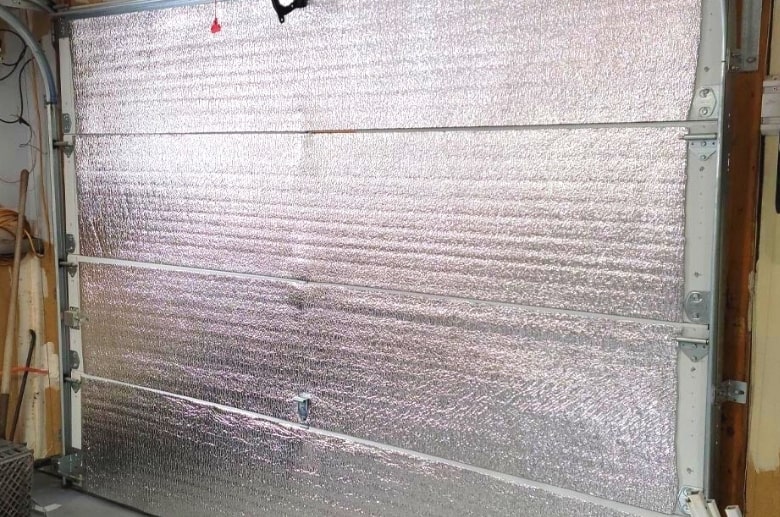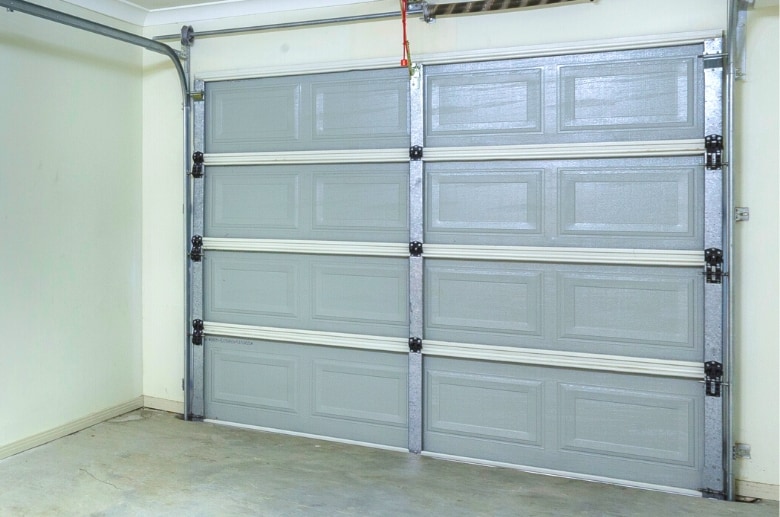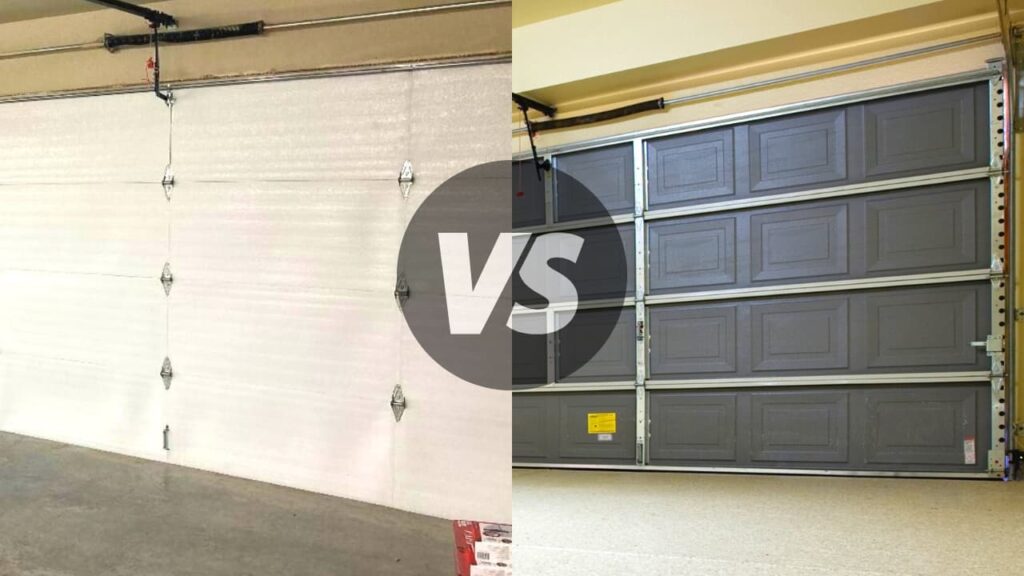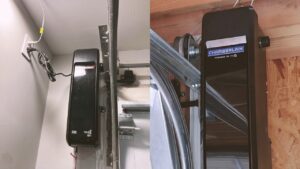According to the U.S. Secretary of Energy Jennifer M. Granholm, insulation, among other home energy retrofits and upgrades, can slash monthly energy bills for families and improve the air we breathe.
One common question we ask daily is, should I insulate my garage door? Or should I keep it as it is?
If you’re unsure about insulated vs. non insulated garage doors, this article will help you make a solid conclusion.
Distinguishing Insulated and Non-insulated Garage Doors
Insulated garage doors are made with additional layers of steel or vinyl and polystyrene/styrofoam to make them more energy-efficient. On the other hand, non-insulated garage doors are made of a single layer of steel.
The benefit of using an insulated garage door with a higher R-value over a non-insulated one is that it has protection against heat or cold. That’s why they are pretty expensive compared to non-insulated garage doors.
Why Should I Insulate My Garage?
Insulating your garage is one of the most reliable ways to protect it from the effects of harsh weather, such as extreme heat and freezing temperatures. Also, it helps maintain average temperatures in your garage during winter and summer.
So, you can comfortably carry out your activities in the garage without stressing about the weather.
It would be best to insulate your garage today, keeping in mind that the weather in the United States is very unpredictable. A report by the National Weather Service predicts that the temperatures will be bitterly cold throughout the years ahead due to global warming.
Therefore, we recommend you insulate your garage to avoid the effects of extremely cold temperatures, such as the car battery losing strength.
Connect With A Garage Expert
Connect with local experts, Compare quotes, Get the best price.
Insulated Garage Door: Pros and Cons

Let’s look at some of the pros and cons of insulated garage doors:
Pros
1. Increase Home Value

Insulated garage doors are durable and withstand extreme weather conditions, increasing the value of your house. Therefore, you can sell your house higher than a home with a non-insulated garage door.
2. Cuts Down Energy Costs
When you install an insulated garage door, you won’t depend on your air conditioner entirely. Therefore, it reduces your energy usage, thereby reducing your energy bills.
According to energy statistics, the average central air conditioner can use about 3000 to 3500 watts per hour which is quite expensive if you use it for an extended period.
3. Stable Garage Temperature
These days, when the garage is also used as a living space, gym, and workstation, it’s extremely important to stabilize the temperature inside it.
The most affordable option is installing an insulated garage door to keep your garage cool in summer and warm in winter.
4. Provides better protection for Cars and Other Properties
An insulated garage door is more reliable in protecting your cars and other properties by ensuring favorable conditions.
For instance, you won’t have problems with a car’s hard start because of the cold, as the insulated door maintains average temperatures in the garage even when it’s too cold.
5. Provides better protection for Cars and Other Properties

As mentioned, an insulated garage door is made of layers of steel or vinyl and polystyrene/styrofoam, causing it to have a longer lifespan than a non-insulated one.
Cons
1. Expensive
An insulated garage door is more expensive than a non-insulated one. Insulated garage doors are made of more layers of steel, aluminum, and insulation materials to make them energy efficient.
2. Can Prove to be Ineffective if the Garage Door is Always in Use
An insulated garage door is meant to prevent the warm air from escaping the garage during winter and block the hot air from getting in. However, an insulated garage door will lose effectiveness if it is often open.
Non-Insulated Garage Door: Pros and Cons

Now you know the benefits and disadvantages of insulated garage doors, what about non-insulated ones?
Here they are:
Pros
1. Is the Cheaper option
A standard garage door price will fall between $750 to $1650. Non-insulated garage doors are cheaper than insulated ones, but you might pay more energy bills for heating your home. This is because non-insulated garage doors have less heat retention capabilities than insulated ones. The prices vary depending on your preferred garage door’s size, type, and design.
2. It is the Most Practical Garage Door for Areas with Mild Climates
If you live in areas with mild climates, a non-insulated garage door will be an ideal option as you will not be experiencing extreme cold or hot temperatures.
3. Preferable for Detached Garages

A non-insulated garage door is preferred for a detached garage because the temperatures don’t affect your home. However, if you have modified your detached garage into a workstation, consider installing an insulated garage door.
Cons
1. Less Effective at Saving energy
A non-insulated garage door doesn’t keep a comfortable temperature in your garage; hence you would have to use other alternatives, such as air conditioning.
2. It Produces Too Much Noise
A non-insulated garage door makes noise when opening and closing because it lacks insulation which acts as a sound barrier.
3. Not as Durable Compared to Insulated Garage Doors
A non-insulated garage door is made of something other than layers of steel and insulation materials. Therefore, they are prone to dents and scratches.
4. Offers Less Protection to Cars and Other Properties
A non-insulated garage door will not maintain consistent temperatures in your garage, meaning your car and other properties aren’t protected from extreme weather conditions.
Insulated VS Non-insulated Garage Doors: Which is Better?
In this section, we will take a closer look at the various factors to consider when deciding between an insulated vs non insulated garage doors. We will explore each element in depth, helping you make an informed decision best suited to your unique situation.
Durability
An insulated garage door is built with more layers of steel and aluminum than non-insulated garage doors, making them versatile. Additionally, the insulation materials added in an insulated garage door (lacking in a non-insulated one) make them weather resistant.
Winner: Insulated Garage Doors
Level of Protection
Opting for an insulated garage door is the optimal way to ensure your home’s protection; these doors are fortified with insulation materials like polyurethane foam and pressed wood, which provides an extra layer of protection against the elements, heat, and noise.
Plus, you’ll enjoy more significant energy savings as a result!
Therefore, an insulated garage door can keep your garage warm during cold days and cool during hot summers hence protecting your properties.
Winner: Insulated Garage Doors
Cost

A non-insulated garage door is cheaper than an insulated garage door. However, an insulated garage door can cut energy costs, while a non-insulated garage door is less efficient. Although a non-insulated garage door is cheap, users can experience expensive energy bills. In contrast, an insulated garage door is expensive but has long-term financial benefits.
Winner: Insulated Garage Doors
Practicality
Going through all the pros and cons above, the non-insulated garage door may seem practical and accessible since it’s cheaper. But when you think deeply, you will realize an insulated garage door offers more value and benefits, such as cutting energy costs, protection from harsh weather, and durability.
Winner: Insulated Garage Doors
Connect With A Garage Expert
Connect with local experts, Compare quotes, Get the best price.
Is Getting an Insulated Garage Door Worth it?
The answer to this question can be subjective based on several factors, but according to our experience, it’s worth investing in an insulated garage door.
An insulated garage door is more expensive than a non-insulated one, which might get you thinking if it’s worth buying. An insulated garage door has many benefits compared to a non-insulated garage door.
- First, buying an insulated garage door saves you from expensive electricity bills. An insulated garage door keeps your home warm, meaning you will not entirely depend on air conditioners.
- Additionally, an insulated garage door adds value to your home, meaning you might sell it more than a home with non-insulated garage doors. Also, keep in mind that homebuyers seek quality homes, and an insulated garage door will be a good sign that your house is of quality construction.
When buying an insulated garage door, check on its R-value and U-factor. The R-value and the U-factor measure the insulation material’s ability to resist heat flow. An insulated garage door with a higher R-value and lower U-Value indicates better insulation. The higher the value, the more insulating effectiveness it is.
Here is a table to guide you.
| R-Value | Heat Loss Resistance |
| R-8 | 90% |
| R-12 | 93% |
| R-16 | 95% |
| R-20 | 96% |
| R-32 | 97% |
Insulated or Non-insulated Garage Doors: Which Should You Choose?
At this point, you clearly understand insulated vs. non insulated garage doors. You can also tell their pros and cons, making it easy to make a solid decision. However, remember that the best door depends on your garage use.
Either way, we recommend buying an insulated garage door to better protect your cars and other properties. Also, you will increase the value of your home and cut energy costs.
Therefore, installing an insulated door in your garage would be best to take advantage of its many benefits, regardless of where you live.




